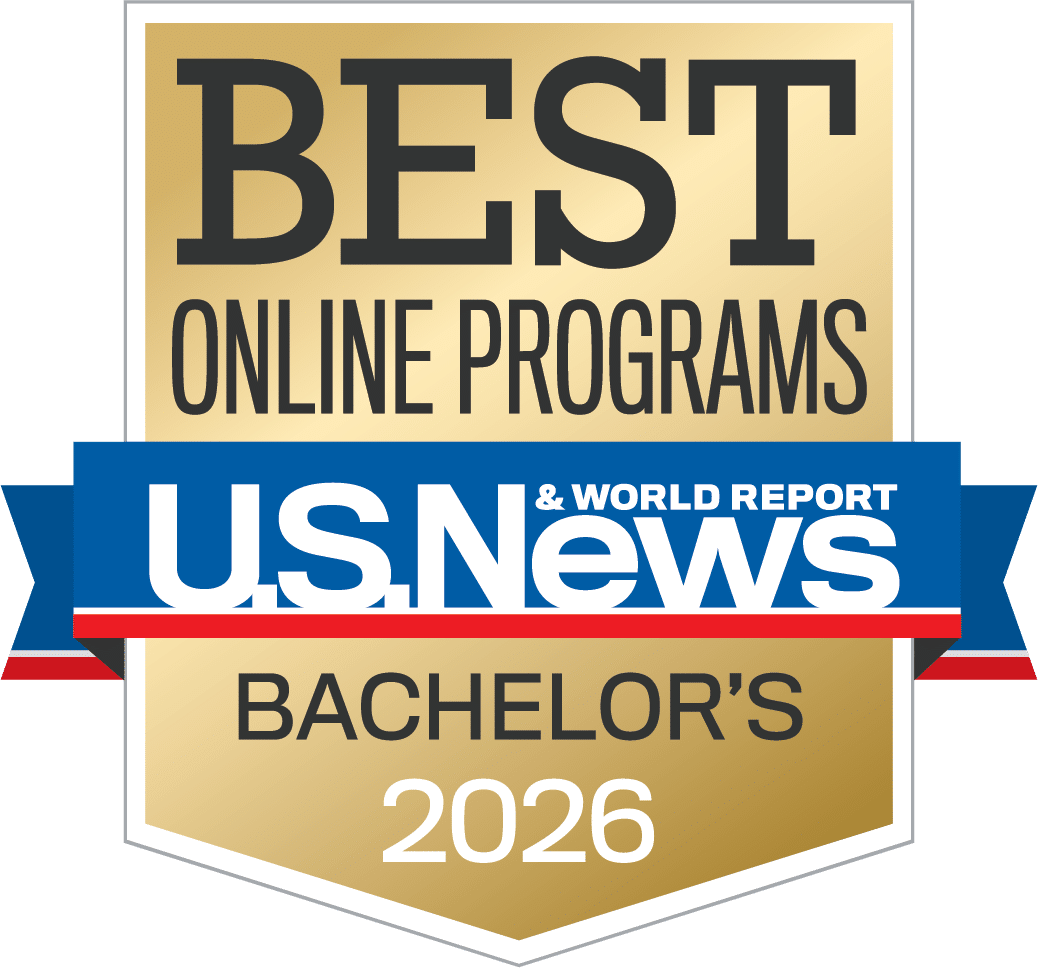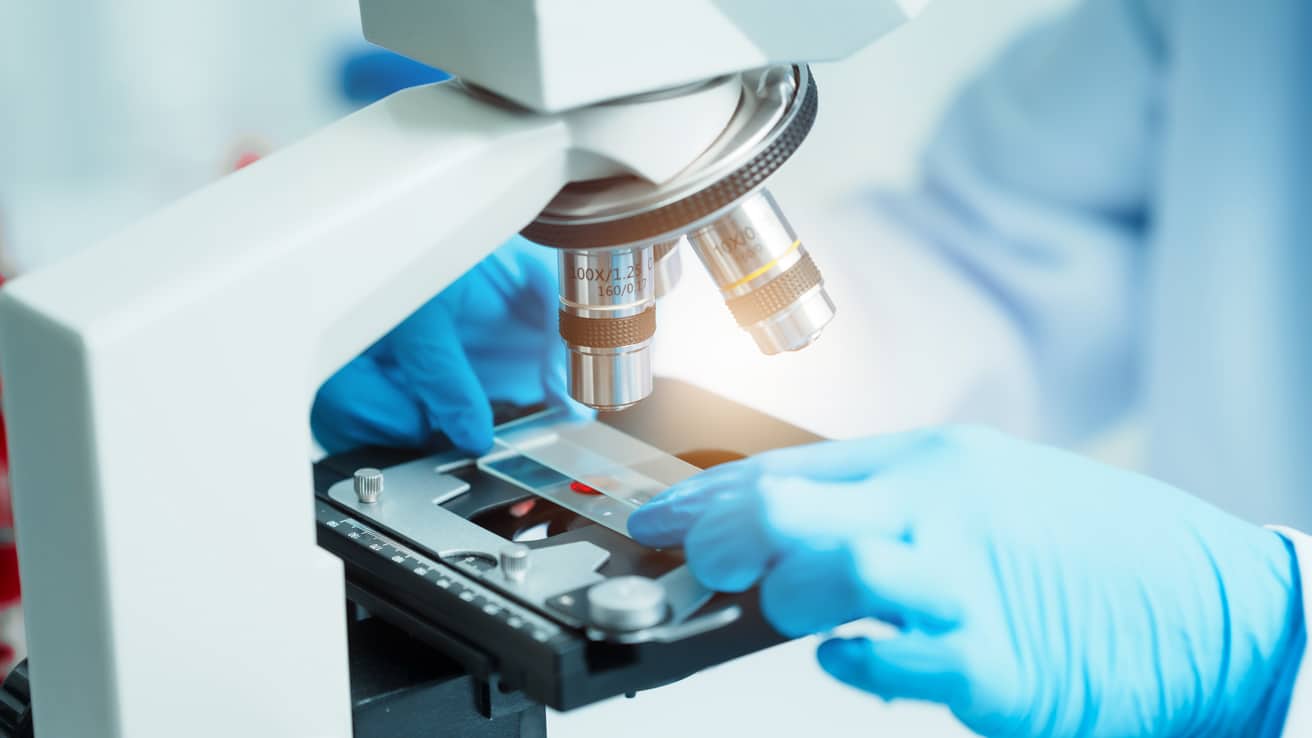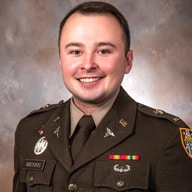MLT to Medical Laboratory Science, Bachelor of Science

May 1, 2026
August 25, 2026
To be eligible for admission to this online Bachelor of Science program, you must hold (or be on track to complete) an associate degree and possess current certification through ASCP or AMT as a Medical Laboratory Technician (MLT).
Advance your career with the online MLT to MLS, Bachelor of Science completion program
The online MLT to Medical Laboratory Science (MLS) Bachelor of Science degree completion program is designed for working Medical Laboratory Technicians (MLTs) seeking to advance their careers. This online MLT to MLS program provides you with the opportunity to advance your education and career in areas like microbiology, clinical chemistry, hematology, immunology, body fluids and transfusion medicine. By offering a flexible online format, this program will accommodate your busy schedule without compromising academic rigor. Our program equips you to deliver accurate diagnoses, ultimately leading to effective treatments and comprehensive patient care.
By completing this online degree, you’ll be eligible to sit for the MLS certification exam through Route 2 eligibility. To meet the exam’s requirements, you must have a bachelor’s degree and at least two years of comprehensive clinical lab experience within the last 5 years. While our program fulfills the degree requirement, it’s important to note that additional professional experience is necessary to sit for the MLS (ASCP) exam.
According to the ASCP 2023 wage survey, MLS professionals earn an average of $76K to $124K annually, compared to $57K to $63K for MLTs. As an MLS, you’ll be equipped to pursue leadership roles in clinical laboratories or take the next step toward graduate studies.
Complete your bachelor’s degree in as little as two years and take the next step in your medical laboratory career.
Why choose Ohio State for the online MLT to MLS program?
The online MLT to MLS program at Ohio State is nationally ranked in the top 10 by Authority. Asynchronous courses offer a flexible learning experience without compromising the quality of education, ensuring the same education with the same NAACLS-accredited curriculum as students learning on-campus.
At Ohio State, you will be joining a program with a strong history of student success:
- Nearly 100% of Ohio State medical laboratory students over the past 3 years have passed the ASCP Board of Registry Certification Exam within a year of graduation, scoring above the national average in all subject areas.
- 100% of graduating students have secured employment or graduate program placement.
With top rankings, flexible coursework, expert faculty, and outstanding student outcomes, this program equips graduates with the knowledge and skills necessary to excel in the field of medical laboratory science.
The Ohio State University online bachelor’s programs are ranked No. 4 (tie) nationally – marking its place within the top 10 for the 10th time since online programs were first ranked at Ohio State 12 years ago. Ohio State is also the only institution in Ohio to be ranked within the top 50 for undergraduate online programs.

U.S. News & World Report
Best Online Programs 2026
Frequently Asked Questions
Once you submit your contact information, a dedicated Enrollment Advisor will connect with you shortly to provide more details about this online program, provide one-on-one guidance, and answer any questions you may have as you navigate the application process. Learn more about the support an Enrollment Advisor offers.
Certified Medical Laboratory Technicians (MLTs) who have completed an associate’s degree who wish to pursue further education to earn their bachelor’s degree should apply. This program will leverage the work experience and previous college credit you have to put towards completing a bachelor of science degree. By completing this program you will be prepared to sit for the ASCP certification exam through route 2 eligibility, given you also meet the years of experience requirement.
No, clinical placements are not required for Ohio State’s online MLT to MLS program. This flexible format allows you to leverage your current work experience as a Medical Laboratory Technician (MLT) while completing your Bachelor of Science degree. You can continue working with your current employer and apply your real-world skills directly to your coursework with no additional clinical hours needed.
A degree completion in Medical Laboratory Science (MLS) offers several advantages over having just an associate’s degree or certification. Graduates often find expanded career opportunities, including leadership roles, research positions, and specialization within the field. Professionals with a bachelor’s degree typically command higher salaries compared to those with associate’s degrees. The in-depth knowledge gained from a bachelor’s program, encompassing medical sciences, laboratory management, and research methodologies, also provides a strong foundation for advanced studies like medicine, dentistry, or graduate school. Additionally, in certain professional settings, a bachelor’s degree is preferred or even required so by completing your degree, you open yourself up to more career opportunities. While an associate’s degree or certification can lead to successful careers, a bachelor’s degree can provide a more comprehensive education, career advancement and greater career flexibility.
The Professional Admissions office offers free transfer credit evaluations for interested students and these can be completed by submitting an online form available on their website. In some cases they may advise you to have the courses further evaluated by the department that offers the course in question. Please do not send your transcripts to The Medical Laboratory Science department, they do not perform transcript reviews or evaluations.
Learn more about prerequisite transfer credit
Earning your Bachelor of Science opens doors to career growth and opportunities in Medical Laboratory Science (MLS). While many MLS graduates work in hospital labs, opportunities span research, quality control, forensics, industry, sales, information systems, fertility, environmental health, public health, and education. Some students go on to pursue advanced degrees in medicine, dentistry, or nursing. Ohio State offers tailored MLS programs to fit various career goals.
Related Content
Related Content

Choosing the best MLT to MLS online program: Why Ohio State stands out

Four reasons why MLTs should pursue a MLS, Bachelor of Science

From Phlebotomist to Medical Laboratory Scientist (MLS): Tiffany’s Journey
Academic Calendar
The online MLT to MLS Bachelor of Science enrolls in Autumn, Spring and Summer terms with application deadlines in May, October and February.
Academic Calendar
The online MLT to MLS Bachelor of Science enrolls in Autumn, Spring and Summer terms with application deadlines in May, October and February.
Admission Criteria
Admission criteria for this program, includes:
- Proof of MLT Certification in good standing with ASCP or AMT
- Completed associate degree (AS or AAS)
- GPA of 2.50 or higher
- Completed pre-requisite courses (see below)
- Knowledge of the field with a strong academic performance in math, chemistry, and biology (science GPA)
These courses must be completed before admission to the program. Ohio State course numbers are shown below, you can explore course equivalences by reviewing the Transferology site.
BIOCHEM 22210: Elements of Biochemistry
BIO 1111: Biological Foundations 1: Cells & Chemistry of Life AND BIO 1112: Biological Foundations 2: Molecular Machinery & Genetics OR BIO 1113.0: Biological Sciences: Energy Transfer and Development
CHEM 1210: General Chemistry I
MATH 1148 or higher: College Algebra
HTHRHSC 2500: Medical Terminology for the Health Professions
STAT 1350.01: Elementary Statistics
*Although completion of this course creates a stronger application, students may be admitted before completing this course. Course must be completed before the Autumn semester of the second year in the professional program.
Request an evaluation of your associate degree courses via the Program Prerequisite Evaluation Form. To review earned college credit from another Ohio institution, use the Prerequisite Coursework Evaluation tool.
In addition to meeting the criteria above, you will be asked to submit a personal statement and two essay responses as part of your application:
- Personal Statement: An opportunity for you to describe yourself and why you are applying to the desired program. Describe how a degree in this program fits into your future plans and career goals. Use evidence such as complete course work, professional experiences or volunteer activities. Limit the response to 300 words or less.
- Essays: Describe an experience you have had working as part of a team, the role you played, and how the team resolved any challenges to working together. What was key to making the team successful? 1,000 word limit. Additionally, describe a difficult situation or set-back you have experienced and what you learned from it. 1,000 word limit.

The Ohio State University participates in the State Authorization Reciprocity Agreements (SARA).
SARA is a national initiative that increases student access to distance education courses and programs while maintaining compliance with state regulations. Institutions participating in SARA can offer educational opportunities in all 49 SARA member states, the District of Columbia, the U.S. Virgin Islands and Puerto Rico without seeking individual approval in each state.
California is not a SARA member state, however, OSU may offer online courses and programs to students located in California under the California Private Post-Secondary Act of 2009.
The Application Process
Once you understand your program’s admission criteria, please note the application deadline. You’ll need a quiet space and a variety of materials for your application. To learn more, please see our Admissions page for the full process. Ready to Apply? Find your application here.
Career Outlook
A Medical Laboratory Science BS degree can lead to a rewarding career in a growing field, with job stability and opportunities for advancement. After completing your bachelor’s degree and earning your MLS certification, you will play a critical role in diagnosing and treating diseases, contributing significantly to medical research.
Top Occupations by Median Income
What They Do
Perform complex medical laboratory tests for diagnosis, treatment, and prevention of disease. May train or supervise staff.
Work Activities
Conduct chemical analysis of body fluids, including blood, urine, or spinal fluid, to determine presence of normal or abnormal components. Analyze laboratory findings to check the accuracy of the results. Operate, calibrate, or maintain equipment used in quantitative or qualitative analysis, such as spectrophotometers, calorimeters, flame photometers, or computer-controlled analyzers.
Wage Range
- Entry Level: $38,020
- Mid Level: $61,890
- Senior Level: $97,990
Job Outlook
Average
Related Careers
- Cytogenetic Technologists
- Cytotechnologists
- Histology Technicians
- Histotechnologists
- Medical and Clinical Laboratory Technicians
Job Sectors
- Biology
- Medicine and Dentistry
- Customer and Personal Service
- Chemistry
- English Language
What They Do
Conduct tests to determine quality of raw materials, bulk intermediate and finished products. May conduct stability sample tests.
Work Activities
Conduct routine and non-routine analyses of in-process materials, raw materials, environmental samples, finished goods, or stability samples. Interpret test results, compare them to established specifications and control limits, and make recommendations on appropriateness of data for release. Calibrate, validate, or maintain laboratory equipment.
Wage Range
- Entry Level: $37,310
- Mid Level: $60,130
- Senior Level: $101,870
Job Outlook
Bright
Projected Growth
5.8%
Related Careers
- Calibration Technologists and Technicians
- Chemical Technicians
- Industrial Engineers
- Quality Control Systems Managers
- Validation Engineers
Job Sectors
- Mathematics
- Production and Processing
- Chemistry
- English Language
- Administrative
What They Do
Plan, direct, or coordinate clinical research projects. Direct the activities of workers engaged in clinical research projects to ensure compliance with protocols and overall clinical objectives. May evaluate and analyze clinical data.
Work Activities
Schedule subjects for appointments, procedures, or inpatient stays as required by study protocols. Perform specific protocol procedures such as interviewing subjects, taking vital signs, and performing electrocardiograms. Assess eligibility of potential subjects through methods such as screening interviews, reviews of medical records, or discussions with physicians and nurses.
Wage Range
- Entry Level: $79,830
- Mid Level: $161,180
- Senior Level:
Job Outlook
Bright
Projected Growth
7.5%
Related Careers
- Clinical Data Managers
- Clinical Nurse Specialists
- Health Informatics Specialists
- Health Specialties Teachers, Postsecondary
- Social Science Research Assistants
Job Sectors
- Customer and Personal Service
- English Language
- Administrative
- Medicine and Dentistry
What They Do
Stain, mount, and study cells to detect evidence of cancer, hormonal abnormalities, and other pathological conditions following established standards and practices.
Work Activities
Examine cell samples to detect abnormalities in the color, shape, or size of cellular components and patterns. Document specimens by verifying patients' and specimens' information. Submit slides with abnormal cell structures to pathologists for further examination.
Wage Range
- Entry Level: $38,020
- Mid Level: $61,890
- Senior Level: $97,990
Job Outlook
Average
Related Careers
- Cytogenetic Technologists
- Histology Technicians
- Histotechnologists
- Medical and Clinical Laboratory Technologists
- Physicians, Pathologists
Job Sectors
- Biology
- Medicine and Dentistry
- English Language
- Administrative
What They Do
Apply knowledge of health and disease causes to evaluate new laboratory techniques and procedures to examine tissue samples. Process and prepare histological slides from tissue sections for microscopic examination and diagnosis by pathologists. May solve technical or instrument problems or assist with research studies.
Work Activities
Embed tissue specimens into paraffin wax blocks, or infiltrate tissue specimens with wax. Cut sections of body tissues for microscopic examination, using microtomes. Stain tissue specimens with dyes or other chemicals to make cell details visible under microscopes.
Wage Range
- Entry Level: $38,020
- Mid Level: $61,890
- Senior Level: $97,990
Job Outlook
Average
Related Careers
- Cytogenetic Technologists
- Cytotechnologists
- Histology Technicians
- Medical and Clinical Laboratory Technicians
- Medical and Clinical Laboratory Technologists
Job Sectors
- Biology
- Production and Processing
- Chemistry
- Customer and Personal Service
- English Language
National occupational information in Ohio State Online’s Career Outlook tool is sourced from O*NET Online and the U.S. Bureau of Labor Statistics (BLS). The median annual wage displayed to the right of each occupational title above is based on the BLS Employment Projections program. Outlook and percent change indicate projected growth or decline over the next 10 years.
Curriculum
Throughout the program you will gain the knowledge and the skills to excel in areas such as microbiology, clinical chemistry, hematology, immunology, bacteriology, body fluids, and transfusion medicine. Medical Laboratory Scientists play a critical role in patient care by performing laboratory tests and communicating results to healthcare providers.
Credit Hour Requirements
To graduate and receive your diploma, a minimum of 120 credits is required to receive a bachelor’s degree. There is no limit to the number of credits that can transfer; however, students must take at least 30 credit hours at Ohio State to receive an Ohio State degree. Below is a list of specialized courses within the program. Additionally, you will be required to take GE Foundation and Theme courses to meet the credit hour minimum to graduate.
Introduce medical mycology, parasitology, and virology in the aspects of fundamental epidemiology, disease transmission routes, clinical correlation of microbial diseases, as well as diagnostic tests to identify commonly encountered and clinically important viruses, fungi, and parasites.
Introduce medical bacteriology in the aspects of fundamental epidemiology, disease transmission routes, clinical correlation of microbial diseases, as well as diagnostic tests to identify commonly encountered and clinically important bacteria.
Introduction to the theory and application of clinical laboratory procedures used to identify and evaluate the formed elements of the blood and hemostatic mechanisms in health and disease.
Provides you with the theory, application, and correlation of clinical immunology knowledge and procedures used to evaluate the function of the immune system in health and disease.
This course introduces you to the scientific writing process by exploring data analysis techniques, developing analytical and critical skills to comprehend evidence, synthesizing research design and outcomes, and finally, written communication of the scientific rigor of evidence to advance clinical practice in healthcare.
Theory and practice of blood banking and transfusion medicine.
This course will cover the biochemical basis for diseases commonly diagnosed or monitored using tests performed in the clinical chemistry laboratory. The basics of the methods used to perform the tests will be discussed as well as their interpretation. Techniques used to evaluate the validity of testing will be covered.
Understanding Online Course Types
As you research the right online program for you, you likely will come across the terms “asynchronous” and “synchronous.” Learn what these terms mean and how they’re important to consider when understanding how a program will fit into your life.
Learn More

Program Faculty
Courses within the MLT to MLS program are taught by the same NAACLS-accredited Ohio State faculty who teach on campus, ensuring a high-quality education that meets rigorous standards.

Tammy L. Bannerman, Ph.D. (ABMM)
Division Director, Medical Laboratory Science, Associate Professor – Clinical
Tammy is the division director for Medical Laboratory Science at The Ohio State University School of Health and Rehabilitative Science. She teaches courses and labs in Medical Laboratory Microbiology and Immunology. Her professional areas of interest are in infectious diseases, immunology and public health microbiology.
Jessica Mantini, MS, MLS (ASCP)
MLS Program Director
Amanda Natter, MS, MLS (ASCP)
Clinical Instructor
Morgan Cummings, MLS, (ASCP)
Med Tech – Training Coordinator
Nicholas T. Funderburg, PhD
Associate Professor, Division of Medical Laboratory Science
Kate Ailstock, MLS, (ASCP)
Research Associate, Division of Medical Laboratory Science
Testimonials
See what past students have to say about their experience in Medical Laboratory Science programs at Ohio State.
Testimonials
See what past students have to say about their experience in Medical Laboratory Science programs at Ohio State.

"I really enjoyed the MLS program! The professors' deep understanding of the material made it engaging, and I can directly apply the knowledge I gained in my current job in blood banking. The classes on hematology and immunology that we took will be highly beneficial in my journey to becoming a physician."

"The Medical Laboratory Science program will allow you to become a certified Medical Laboratory Scientist and apply your passion for science and healthcare in a hands-on setting. A Medical Laboratory Scientist is crucial in diagnosing and treating diseases, as well as contributing to patient care outcomes through accurate testing and analysis."

"The Medical Laboratory Science program allowed me to develop and enhance my laboratory skills while also providing career guidance and mentorship. The knowledge, techniques, and advice I received from the program has allowed me to become a successful Medical Laboratory Scientist, Supervisor, Manager, and Senior Manager. My career goal is to continue to develop and grow as a leader while helping play a vital role in patient care."

"The medical laboratory science curriculum has been incredibly helpful for medical school, particularly the hematology, immunology, microbiology, blood banking, and body fluid analysis. I am constantly grateful for my education in the program and find that I not only learned the information well in the MLS program but that it is retainable. "
Tuition fees are subject to change. The table above serves as a guide and not an official bursar’s bill. Full-Time costs are total tuition costs per semester.
Financial Aid Resource
Financial Aid Resource
Related Articles
Related Articles

How to ask your employer for tuition reimbursement
How to Pay for Your Online Program

Tips for Online Learning from Ohio State Students and Faculty
Get Started
Connect with a knowledgeable Enrollment Advisor who can help answer your questions and explain different aspects of the more than 80 online degrees and certificates offered at Ohio State. They are here to help you on your education journey.



